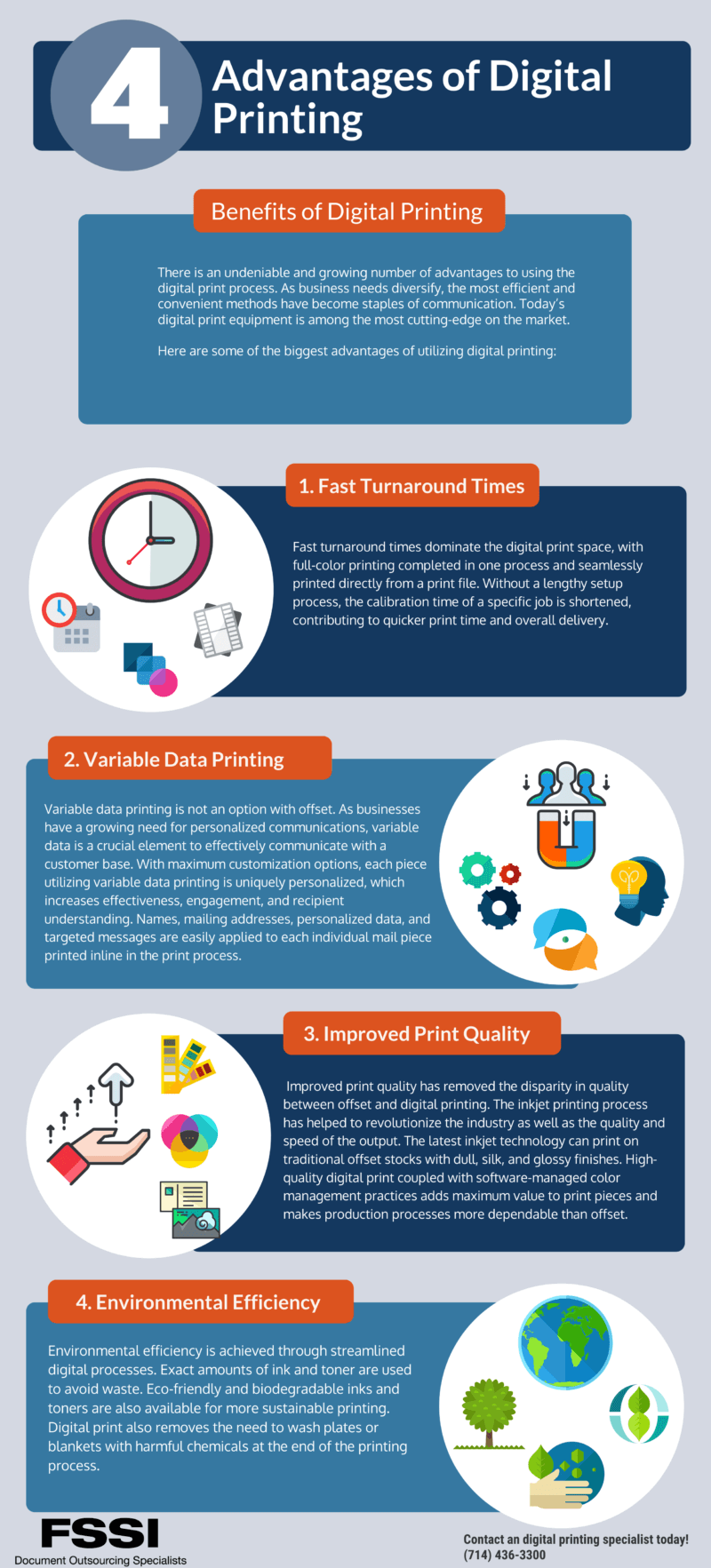Examine This Report about Digital Printing
Examine This Report about Digital Printing
Blog Article
Get This Report on Digital Printing
Table of ContentsWhat Does Digital Printing Mean?Digital Printing Things To Know Before You Get ThisThe Best Strategy To Use For Digital PrintingDigital Printing Fundamentals ExplainedNot known Incorrect Statements About Digital Printing The Buzz on Digital Printing
Variable data printing, such as direct mail with personalized codes and addresses, is ideally matched for digital printing. Digital fast printing just needs four steps of style, testimonial, printing and binding to get every little thing done. Digital fast printing has an exceptional benefit: print on demand.According to PMMI, electronic printing permits brand names and manufacturers to react promptly to consumer needs while enhancing the supply chain, minimizing warehousing expense and waste, and taking pleasure in faster time to market. That all noises great, however exactly how does this innovation do all that? The significant differentiator of these modern technologies is that there are no set up charges and no plates with digital printing.
Digital Printing Fundamentals Explained
According to Wikipedia, the best difference in between digital printing and conventional approaches such as lithography, flexography, gravure, or letterpress - Digital Printing is that there is no demand to replace printing plates in digital printing, whereas in these analog printing methods the plates are repetitively changed. This results in quicker turnaround time and decreases expense when utilizing electronic printing.
Digital printing is highly flexible, so it's easy to make changes to the bundle layout quickly. It all goes back to the plates.
With traditional printing techniques, short-run printing is simply not feasible. Because an excellent layout can make or break your product, digital printing constantly produces top quality, clear and vibrant graphics each time.
Digital printing is the process of printing digital-based images directly onto a variety of media substrates. There is no requirement for a printing plate, unlike with countered printing. Digital documents such as PDFs or desktop posting documents can be sent out straight to the electronic printing machine to publish theoretically, picture paper, canvas, material, synthetics, cardstock and various other substrates.
Some Known Details About Digital Printing
According to PMMI, digital printing enables brands and suppliers to respond quickly to consumer demands while enhancing the supply chain, decreasing warehousing expense and waste, and enjoying faster time to market. That all noises wonderful, however how does this modern technology do all that? The significant differentiator of these innovations is that there are no set up charges and no plates with digital printing.
According to Wikipedia, the greatest distinction between electronic printing and conventional approaches such as lithography, flexography, gravure, home or letterpress is that there is no requirement to change printing plates in electronic printing, whereas in these analog printing techniques the plates are repeatedly changed. This leads to quicker turnaround time and decreases price when using digital printing.

Everything about Digital Printing
With standard printing methods, short-run printing is simply not possible. Since a great style can make or break your item, digital printing constantly creates top quality, clear and vibrant graphics each time.

According to PMMI, electronic printing permits brands and manufacturers to respond promptly to customer needs while improving the supply chain, reducing warehousing expense and waste, and enjoying faster time to market. That all noises excellent, but how does this technology do all that? The significant differentiator of these modern technologies is that there are no set-up charges and no plates with digital printing.
7 Simple Techniques For Digital Printing
According to Wikipedia, the best distinction in between electronic view it now printing and traditional approaches such as lithography, flexography, gravure, or letterpress is that there is no requirement to replace printing plates in electronic printing, whereas in these analog printing methods home plates are repeatedly changed. This causes quicker turn-around time and reduces price when using electronic printing.
Rapid manufacturing indicates getting your item to market quicker. It also implies it's simpler and faster to make changes in the future, when you transform a dish, add a SKU, or develop seasonal product packaging. Digital printing is very adaptable, so it's simple to make changes to the package design quickly. All of it returns to home plates.

About Digital Printing
Digital printing is the procedure of printing digital-based images directly onto a range of media substrates. There is no demand for a printing plate, unlike with countered printing. Digital files such as hop over to these guys PDFs or desktop computer posting documents can be sent straight to the electronic printing press to print theoretically, picture paper, canvas, textile, synthetics, cardstock and other substrates.
Report this page